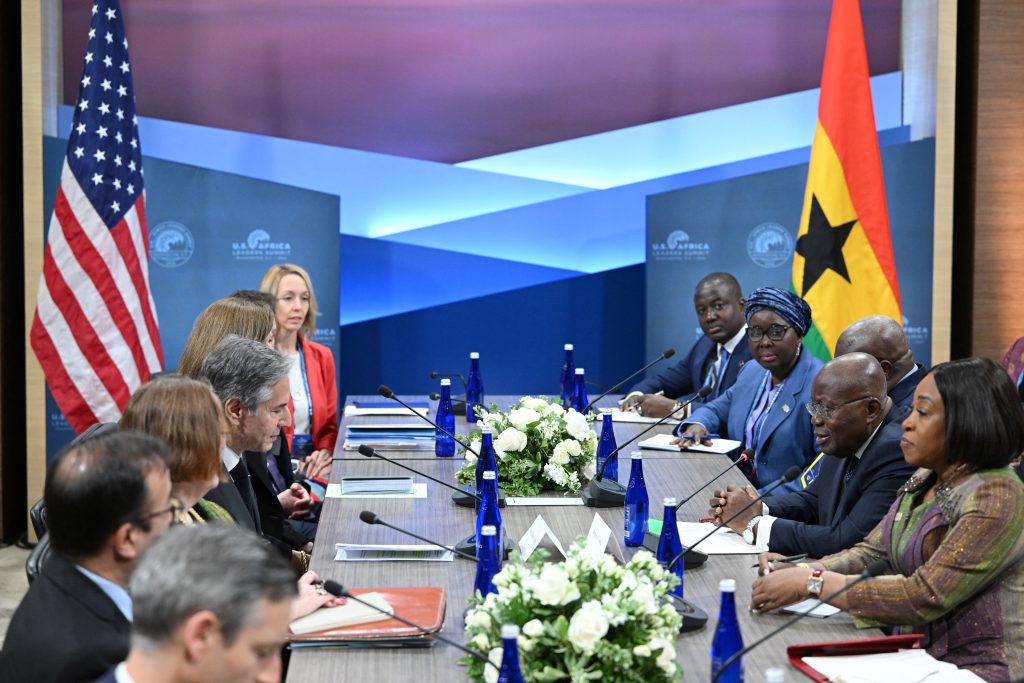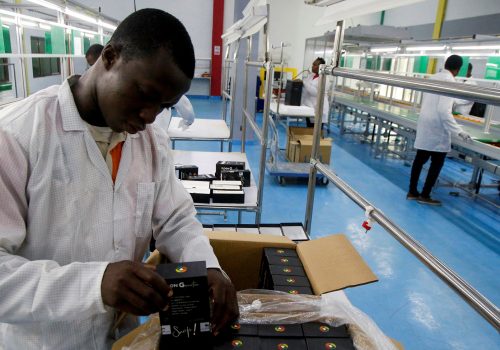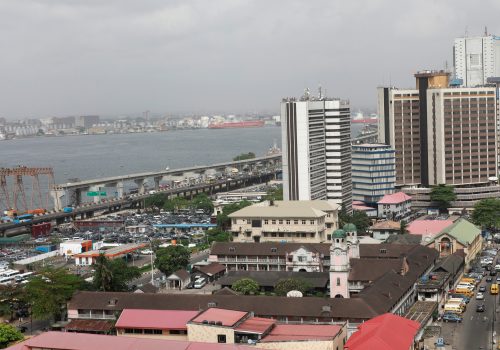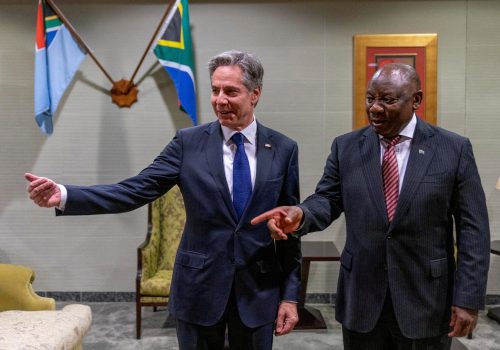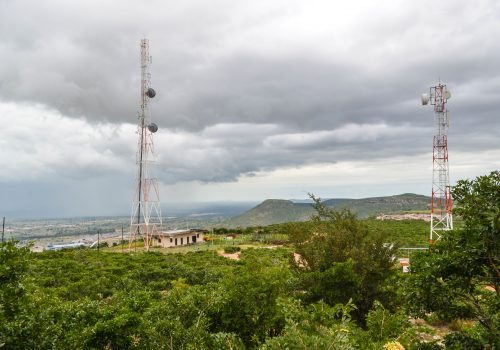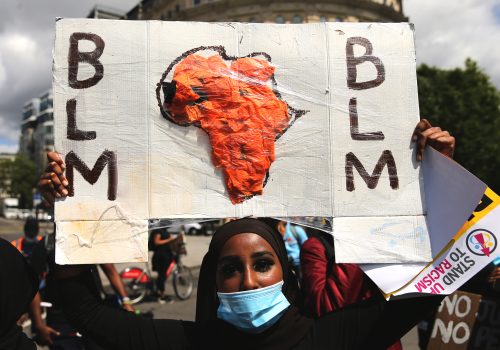After an eight-year hiatus, the US-Africa Leaders’ Summit returned to Washington last month amid heightened global geopolitical tension and economic uncertainty. Why? Because Africa’s voice, economic potential, and geopolitical posture are more critical than ever. And the United States knows it.
The United States has traditionally focused on security priorities in its African engagement. This Cold War vision not only dominates perceptions in the public and private realms but also distracts from the authentic economic and strategic opportunities the continent offers investors in the twenty-first century. The impact of the 9/11 attacks has strengthened this approach over the past two decades. More recently, the United States has seen Africa as a battleground for competition with China, ignoring that the continent’s nations have their own strategic interests.
The December summit offered signs that the Biden administration recognizes the limitations of that approach. Yet to change that, the United States must build on its commitments to African leaders in Washington.
A new approach
The emphasis at the summit was not on threats but on opportunities, not on security but on business engagement, diaspora ties, and Africa’s cultural soft power. The message continued when, earlier this year, US Secretary of State Antony Blinken unveiled a new US Strategy Toward Sub-Saharan Africa that emphasized that the United States would be looking for partnerships with African nations rather than dictating terms to them.
Blinken’s multiple trips in Africa, from Senegal to South Africa and Kenya to the Democratic Republic of Congo in 2022, followed by a tour of the continent this week by Treasury Secretary Janet Yellen, show that the Biden administration is taking Africa’s emergence as an influential global player seriously.
The war in Ukraine has demonstrated the willingness of African nations to use their votes at multilateral platforms—30 percent of United Nations (UN) General Assembly votes belong to African countries—in pursuit of their national interests. In vote after vote at the UN, many African nations have abstained from outright condemnation of Russia’s invasion. This search for strategic autonomy is also reflected in other bold initiatives, such as a proposal by the Brazil-Russia-India-China-South Africa grouping, BRICS, to develop its own currency. The grouping, which South Africa will chair in 2023, already has its own development bank.
Even as it focuses on Taiwan and Ukraine, it is time for the United States to recognize Africa’s centrality in the geopolitical churn the world is witnessing. After all, the United States also has vital interests at stake in Africa.
Follow the money
On the summit’s last day, the Biden-Harris administration announced plans to invest at least fifty-five billion dollars in Africa over the next three years.
This follows many other nations making similar investment announcements: China pledged forty billion dollars late last year, Japan promised thirty billion dollars in August, and India said last July that it will boost investment to $150 billion by 2030.
Furthermore, China is a leading source of greenfield foreign direct investment (FDI) —when foreign companies create local subsidiaries—in Africa, investing more than seventy-one billion dollars from 2016-2020. On the other hand, the United States was the fourth highest source of African greenfield FDI during the same time, totaling twenty-three billion dollars. While the United States is a stable partner for the continent, it invests less in Africa than in any other region. The United States needs to fix that to signal to African nations that they are genuinely valued as strategic and trusted partners in addressing global crises, including energy production, food insecurity, and job creation.
Out with the old and in with the new
The US National Defense Strategy, unveiled in October, also signals the shift in approach toward Africa as a partner rather than a region that the United States can dictate to. This strategy document has outlined a new policy on working through partners on security matters.
With France rethinking its security focus in West Africa and the Sahel, and Europe focused on North Africa, General Stephen Townsend, then-commander of US Africa Command, said last year: “I think there’s actually room on the continent for all of us to do our respective nations’ business.” China, by assisting in anti-piracy patrols, has played a helpful role too, he said.
Such an approach has lent credibility to the Biden-Harris administration’s claim that it does not seek to turn Africa into a sphere of great-power competition. Africa will not have to choose between potential partners.
With a firm security foundation, global FDI in the fast-growing creative and cultural industries, technology, mining, and agribusiness will continue. Some of the mechanisms through which the White House plans to strengthen the partnership with Africa include established platforms such as ProsperAfrica, the US Agency for International Development (USAID), the US Export-Import Bank, the Millennium Challenge Corporation, and the Development Finance Corporation.
Yet it is vital for the United States to be mindful that the priorities of the two sides might not always align. On climate, for example, while the United States seeks to lead the world to reduce its dependence on fossil fuels, African nations where crucial natural gas discoveries have been made eye gas as a critical temporary source of power.
The task of finding a path forward on all these issues will fall to longtime US diplomat Johnnie Carson, who is the special representative implementing the agreements from the US-Africa Leaders’ Summit.
More than a summit
Even as Africa grapples with the impact of the war in Ukraine and the lingering effects of the pandemic, the United States could redefine its relationship with the continent if it offers a game-changing answer to the main challenge African markets face: access to international capital.
Yet that challenge is also the result of an inadequate understanding of Africa’s opportunities. At a welcome dinner for visiting African heads of state hosted by the Africa Center, Atlantic Council Chairman John Rogers, who is also executive vice chairman of Goldman Sachs, said: “Outside of this room, most would be surprised to hear that Africa’s debt is lower than European debt.” The African Export-Import Bank, also known as Afreximbank, has pointed out how Italy’s external debt at the height of the COVID-19 crisis ($2.6 trillion) was more than three times what all African countries combined owed to their external creditors at the end of 2019.
“Nonetheless, it is easier today for African nations to borrow from the Chinese. We must continue to work hard to change this and to overhaul outdated risk profiles that put open markets at a disadvantage when providing loans or working capital to African nations,” Rogers said, echoing African Union Chairperson Macky Sall’s advocacy at that same event for a pan-African rating agency.
In 2021, investment flowing to Africa reached a record eighty-three billion dollars. The private sector must boost support for policymakers to address Africa’s economic and green transformation. During the US-Africa Business Forum as part of the main summit, US President Joe Biden noted that his administration was “working with Congress to invest $350 [million] to facilitate more than almost half a billion dollars in financing to make sure more people across Africa can participate in the digital economy.”
The road ahead
In 2022 the United States took steps to center its relationship around mutually beneficial partnerships. The summit solidified this approach, but the United States will need to put words into action to succeed. This year offers it a unique opportunity to reset and reengage its relationship with Africa.
People-to-people ties are a critical area that separates the United States from other contenders seeking influence in Africa. There, the United States has no competitors. From Hollywood to Silicon Valley, the American way of life remains attractive to many young African people—as it does to their peers in other parts of the world. The connection between Africa and the Black community in the United States serves as another resilient and robust bond.
African leaders recognize this too. Ghana’s President Nana Akufo-Addo is trying to attract the diaspora to invest in his country’s development through a project called Beyond the Return. Meanwhile, the President’s Advisory Council on African Diaspora Engagement in the United States is trying to build a new narrative that recalls the past but builds a future that reconnects both continents based on shared prosperity.
This year could also witness the United States outflank its geopolitical rivals. Russia, which centers its engagement in Africa around arms diplomacy, is mired in the conflict it started in Ukraine. It is unclear how long Russia can afford to send military hardware or mercenaries abroad when it desperately needs them in Ukraine. China, likewise, is undergoing turmoil. COVID-19 continues to play havoc with its economy and social order, resulting in some of the most widespread protests the country has seen in decades. The Chinese Communist Party might focus inward rather than outward in the coming months.
All this leaves the United States room for maneuver. If it can make up lost ground and build on what it started with the December summit, the United States and Africa will prosper.
Rama Yade is the senior director of the Atlantic Council’s Africa Center and a senior fellow at the Europe Center. She is a professor at Sciences Po Paris and Mohammed 6 Polytechnic University in Morocco. She was a member of the French cabinet, serving as deputy minister for foreign affairs and human rights and ambassador to UNESCO.
Further reading
Thu, Jun 16, 2022
Better data is the key to unlocking major investment in Africa
AfricaSource By Tom Koch
As COVID-19 and the war in Ukraine continue to hurt the African continent, many countries will require significant investment to revitalize their economies. But a persistent attribute of many African markets will continue to be a barrier to private investment: a relative lack of data. This drives up diligence costs, creates difficulties in valuing assets, […]
Tue, Dec 13, 2022
US-Africa Leaders Summit could make history—if leaders recalibrate trade relations
AfricaSource By
Africa has been squeezed into a limited role in global value chains. But leaders in Washington this week can rebalance the US-African trade relationship—and fulfill Africa's economic potential.
Fri, Dec 2, 2022
The Africa investment imperative: Diversification and resilience amid economic downturns
AfricaSource By
At a time when investors are faced with high risks due to a global economic downturn, African markets are a viable investment opportunity.
Tue, Aug 30, 2022
Inaction to reform the international development system is not an option anymore
AfricaSource By Rama Yade
Africans are looking at the United States’ focus on the war in Ukraine and on tensions in the Indo-Pacific, and they’re wondering: Will the United States truly consider African countries as strategic partners as China and Russia claim to do?
Thu, Apr 8, 2021
The digital infrastructure imperative in African markets
AfricaSource By Aubrey Hruby
Over the past two decades, Chinese companies have come to dominate the telecom infrastructure landscape in emerging markets. The United States can slow and possibly erode these Chinese gains by promoting innovative US technologies and providing resources to help unleash the second wave of the internet revolution in African countries.
Mon, Jun 20, 2022
Time to get ‘glocal’: Here’s how the US can better connect the African and African diaspora communities
AfricaSource By Tyrell Junius
In this new vision, the United States should implement policies at the local level that fold into an international agenda.
Image: U.S. Secretary of State Antony Blinken meets with Ghana's President Nana Akufo-Addo during the US-Africa Leaders Summit at the Walter E. Washington Convention Center in Washington, DC, U.S. December 14, 2022. Mandel Ngan/Pool via REUTERS
